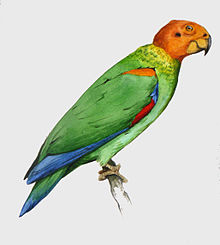Bald parrot
| Bald parrot | |
|---|---|
 |
|
| Bald parrot (Pyrilia aurantiocephala) | |
| Scientific classification | |
| Kingdom: | Animalia |
| Phylum: | Chordata |
| Class: | Aves |
| Order: | Psittaciformes |
| Superfamily: | Psittacoidea |
| Family: | Psittacidae |
| Subfamily: | Arinae |
| Tribe: | Androglossini |
| Genus: | Pyrilia |
| Species: | P. aurantiocephala |
| Binomial name | |
|
Pyrilia aurantiocephala (Gaban-Lima, Raposo & Hofling, 2002) |
|
| Synonyms | |
|
Pionopsitta aurantiocephala Gaban-Lima, Raposo & Hofling, 2002 |
|
Pionopsitta aurantiocephala Gaban-Lima, Raposo & Hofling, 2002
Gypopsitta aurantiocephala
The bald parrot (Pyrilia aurantiocephala) or orange-headed parrot is a species of parrot in the family Psittacidae. It was formerly placed in the genus Pionopsitta, which is now monotypic. It is endemic to the east-central Amazon of Brazil. Its natural habitat is tropical moist lowland forests. It is considered near threatened by BirdLife International (and consequently IUCN) due to the widespread deforestation of the Amazon.
This parrot was initially believed to be a juvenile of the vulturine parrot due to the orange coloration of its bald head as opposed to the black of the vulturine. However, when it was discovered that the individuals were sexually mature, they were described as a new species. In reality, juveniles of both species have feathered, greenish heads quite unlike those of the adults.
The bald parrot is a medium-small, overall green parrot with a bald, brownish-orange head. As several other members of the genus Pyrilia, it has red underwing coverts that barely are visible when perched, but highly conspicuous in flight.
...
Wikipedia

